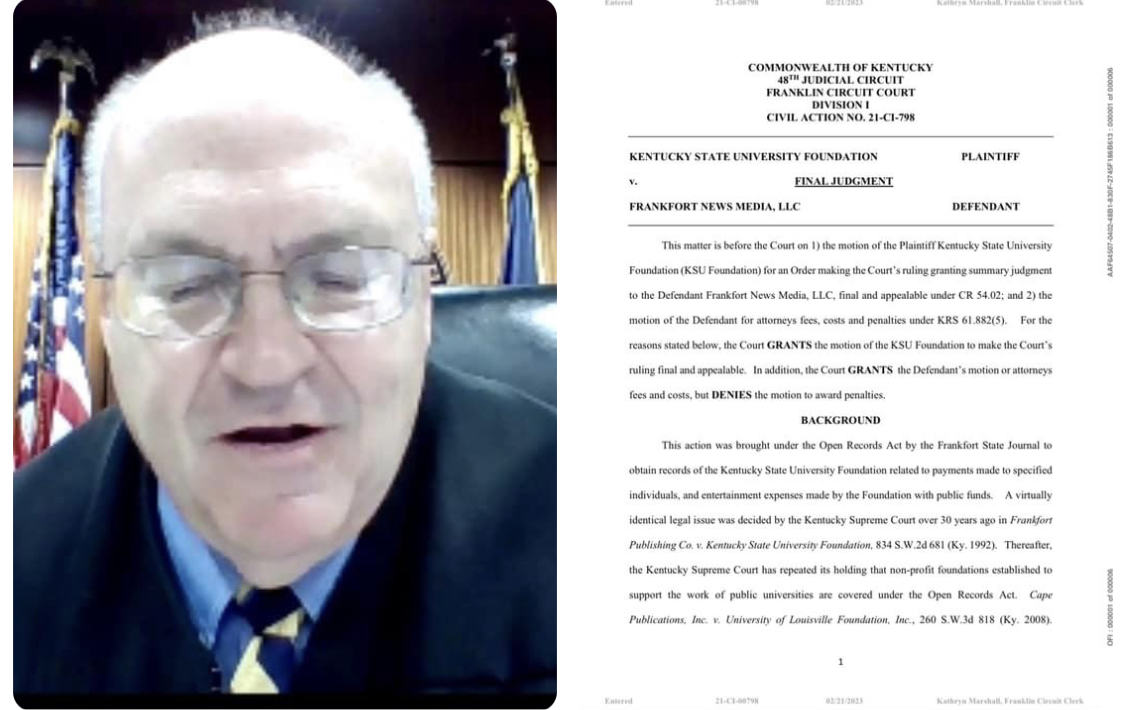
The Franklin Circuit Court yesterday awarded $29,862 in attorneys fees and costs to The State Journal in an open records appeal filed by Kentucky State University Foundation in October 2021 and decided against the Foundation in August 2022.
The State Journal is represented in the case by Jeremy Rogers and Suzanne Marino, attorneys in the Louisville office of Dinsmore & Shohl. Rogers is a highly regarded First Amendment and open government advocate and a member of the Kentucky Open Government Coalition’s Board of Directors.
In 2021, the Foundation appealed an Attorney General’s open records decision determining that it is a public agency for open records purposes based on the Supreme Court’s 1992 opinion in Frankfort Pub. v. Kentucky St. Un. Found, 834 S.W.2d 681 (Ky. 1992).
https://casetext.com/case/frankfort-pub-v-kentucky-st-un-found
https://www.insidehighered.com/quicktakes/2022/08/15/kentucky-judge-rul…
https://www.thecollegefix.com/university-cannot-hide-from-open-records-…
The Foundation previously denied former State Journal reporter Austin Horn’s request for “copies of records related to payments made to a specific individual for a two-year period as well as ‘payments made for the purposes of parties celebrating [the specific individual’s] birthday[.]’” The referenced individual was former KSU president Christopher Brown. Horn also requested “any records or documentation reflecting payments of more than $1,500 made to any entity or individual[.]”
Horn — who is a Kentucky Open Government Coalition director and now a political reporter for the Lexington Herald-Leader — successfully appealed the denial to the Kentucky Attorney General.
https://ag.ky.gov/Resources/orom/2021/21-ORD-179.pdf
The thrust of the Foundation’s argument was that KSU and the KSU Foundation made a conscious effort to “disaffiliate” after the 1992 Supreme Court opinion to ensure that the foundation would no longer be treated as a public agency for open records purposes and its records would no longer be inaccessible under the open records law.
In rejecting this argument, and ultimately awarding attorneys fees and costs, the court on February 21 reasoned:
“The KSU Foundation argues that it should not be responsible for attorneys fees because it allegedly had a good faith basis for the denial of the records requests. Under the plain language of the statute, the test is not whether the agency acted in good faith. The test is whether ‘the records were willfully withheld.’ In other words, if the agency’s denial was attributable to an accidental or unintentional oversight (such as the misfiling of a document, or that the request was accidentally misplaced), the Court can deny the motion for attorneys fees. But when the agency acts intentionally, on purpose, based on a knowing assertion of a legal exemption that is rejected by the court, then the party requesting documents should be awarded attorneys fees. Otherwise, the party that is successful in court, and which has to go to the enormous expense of hiring lawyers and pursuing litigation, is penalized for the successful vindication of the requirements and policies of the Open Records Act. Such an outcome would discourage citizens from pursuing their rights under the Open Records Act, contrary to the express requirements enacted by the legislature. The failure of the Court to award attorneys fees in this case would reward and encourage a policy of denial and delay by public agencies that would severely undermine the effectiveness of the Open Records Act.”
https://apps.legislature.ky.gov/law/statutes/statute.aspx?id=23066
The court denied The State Journal’s motion for an award of penalties. Briefly addressing the issue, the court observed:
“The KSU Foundation’s argument that it should not have to pay attorneys fees because it had a good faith basis for the denial is not relevant to the award of attorneys fees because it unquestionably acted ‘willfully,’ and it would undermine the purposes of the Open Records Act to penalize the successful Plaintiffs by imposing on them the enormous burden of the cost of litigation. However, the Court finds the KSU Foundation’s intentional, but mistaken, reliance on the statutory changes may be considered in connection with the Plaintiff’s request for the imposition of penalties under KRS 61.882(5). In the narrow circumstances of this case, the Court will exercise its discretion to decline to impose civil penalties, seeing no need to impose any additional penalties on this public agency when it is required to pay such a substantial sum in attorneys fees.”
Importantly, the court granted the Foundation’s motion to make the ruling final and appealable.
Now, we begin the waiting game to see if the KSU Foundation will expend addition funds, and tie up additional judicial resources, in the hope of obtaining an appellate court ruling that it is not required to pay The State Journal’s attorneys fees and costs, and a reversal of the underlying legal analysis that proponents of open government in Kentucky have pointed to with pride as other states’ courts permit foundations affiliated with public agencies to operate without public oversight and accountability.
https://www.insidehighered.com/quicktakes/2019/12/13/private-foundation…
https://www.fairfaxtimes.com/articles/virginia-supreme-court-favors-gmu…
https://nmfishbowl.com/2022/12/04/the-dispute-here-is-not-merely-academ…


